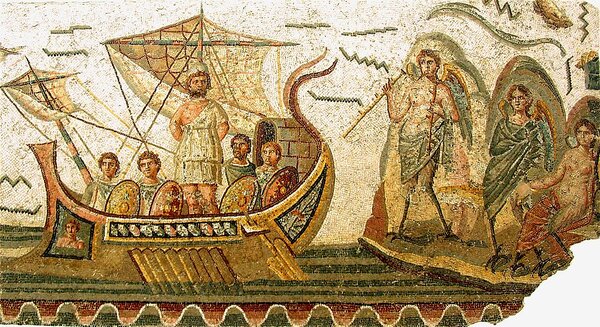A dramatic monologue is a lyric poem in which a single imaginary speaker or a historical personage expresses his thoughts and feelings to an imaginary silent audience. Alfred Lord Tennyson‘s poem “Ulysses” is a masterful example of the dramatic monologue form. The poem was first published in 1842 and is considered one of the most important works of the Victorian era. The poem’s protagonist, Ulysses, is a complex character who speaks directly to the reader, revealing his thoughts, feelings, and motivations.
In the poem, Ulysses, standing before the royal palace of Ithaca, speaks before the mariners, who had been his fellow sojourners during his long journey to Troy. He speaks of his dissatisfaction with his current state of life. He is an aging king who has returned home to Ithaca after a long and arduous journey. Despite his accomplishments and the love of his people, Ulysses is restless and eager for new adventures. He longs to leave his domestic life behind and embark on a new journey to explore the world and seek new challenges.

The dramatic monologue form is particularly effective in portraying the internal conflict that Ulysses experiences. The reader can see the contrast between his desire for adventure and his responsibilities as a husband and father. Ulysses acknowledges his love for his wife and son, but he cannot ignore the call of the sea and the desire for exploration that burns within him. He says:
I am a part of all that I have met;
Yet all experience is an arch wherethro’
Gleams that untravell’d world, whose margin fades
For ever and for ever when I move.
The poem also explores the theme of mortality and the fear of growing old. Ulysses is acutely aware of his own mortality and the passage of time. He speaks of how he has grown old and how his physical strength has diminished. Despite this, he is not content to sit back and live out the remainder of his days in comfort. Instead, he longs to make the most of the time he has left, to live life to the fullest, and to leave a legacy that will endure after he is gone.
The monologue reaches the point of climax when Ulysses inspires his sailors and makes an appeal to them to enter a life of exploration with great courage. He says:
Death closes all, but something ere the end
Some work of noble note, may yet be done.
The poem’s language is rich and evocative, capturing the essence of Ulysses’ character and the world in which he lives. The use of metaphor and imagery creates a vivid and powerful picture of Ulysses’ longing for adventure and the world he seeks to explore. The poem’s structure also contributes to its effectiveness, with the repetition of the phrase “To strive, to seek, to find, and not to yield” serving as a powerful refrain that underscores the themes of the poem and the character of Ulysses.
In conclusion, “Ulysses” is a remarkable example of the dramatic monologue form. The poem’s protagonist, Ulysses, is a complex and multi-dimensional character who speaks directly to the reader, revealing his thoughts, feelings, and motivations. The form of the dramatic monologue allows the reader to gain an intimate understanding of Ulysses as a character and provides a powerful insight into the human condition. The poem’s themes of mortality, the fear of growing old, and the desire for adventure are timeless, making “Ulysses” a poem that continues to resonate with readers today.
Additional Reading
Character of The Duke in Browning’s My Last Duchess
Duke in Robert Browning‘s “My Last Duchess” is a controlling and entitled aristocrat who embodies toxic masculinity. He believes that...
Read MoreCharacter of Ulysses in Tennyson’s Poem
Alfred Lord Tennyson’s poem “Ulysses” is a dramatic monologue that tells the story of the legendary Greek hero Ulysses as...
Read MoreCritical Appreciation of Emily Dickinson’s I Cannot Live With You
Emily Dickinson’s I Cannot Live With You is a masterpiece of emotional depth and intellectual rigor. This critical appreciation delves...
Read More





thank you Nibble Pop for making Literature so easy. Love your videos too!!